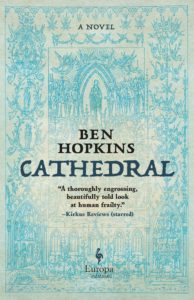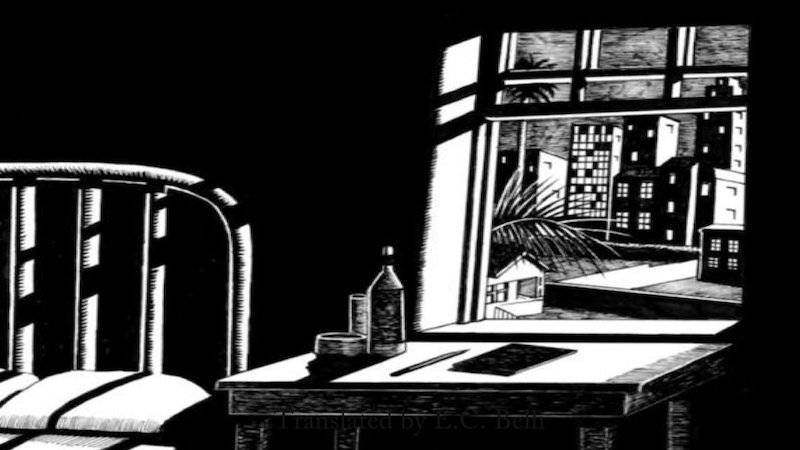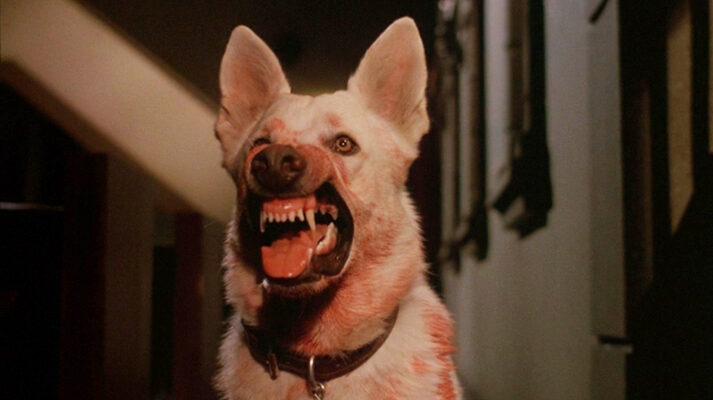Ben Hopkins on Conjuring the Power of Gothic Architecture
in Fiction
The Author of Cathedral in Conversation With Jane Ciabattari
Ben Hopkins has spent most of his career in film, creating award-winning features and documentaries, including 37 Uses for a Dead Sheep, a documentary about the Pamir Kirghiz, an Afghan tribe now living in Eastern Turkey (billed as a collaboration between the London film crew and the tribe in telling their history), Welcome to Karastan, aka Lost in Karastan, a feature about a washed-up filmmaker attending the “world’s worst film festival” in the Republic of Karastan, and Hasret-Yearning, in which filmmakers doing a documentary about the life of Istanbul (so low budget they travel by container ship from Berlin to Istanbul) turn toward the mysterious secretive side of the city. The films mix fact and fiction, slapstick and noir, gothic and satire. Not exactly the approach Hopkins takes in Cathedral, his first novel, although it includes humor, a huge cast of narrators (15), and a clear fascination with the widest range of human behavior.
Cathedral covers half a century in the fictional Hagenburg, Germany, and revolves around the building of a cathedral (and of a middle class, a mercantile system), beginning in 1229 and continuing after Hopkins’s narrative ends. It’s a big book (624 pages); it took some seven years to write. (While working on it he got married, became a father, wrote seven screenplays and made two of his films, in Tblisi and Istanbul.)
Happily for Hopkins, Cathedral started off with two starred pre-pub reviews, from PW and Kirkus. He says he has no plans to come to the US to celebrate publication. (“Presently that’s very difficult to arrange—EU passport holders need special permission to get into the US. I know this very well as I was shooting a documentary in Chicago in October and it was very difficult to get a special visa for that.”) But you can hear him read from the prologue and first chapter here. He’s completed the rough draft of a new novel, and expects to spend much of 2021 on revisions. We kicked emails back and forth over time zones, he in Berlin, I in Sonoma County, California.
*
Jane Ciabattari: You were born in Hong Kong. What were your parents doing there? You lived in America and London off and on while growing up, and studied in the UK. Is this early moving around what draws you to what you’ve called your “nomadic” lifestyle?
Ben Hopkins: My father was a Professor of Sociology, initially, and later became a Professor of Ancient History. His first posting as a professor was in Hong Kong, where I was born. After that I spent the first five or six years of my life traveling between London and Princeton NJ . . . and then we finally settled down in England, where I went to school and then later to University. I studied German and Italian at Oxford, and then, after a two-year break, studied Film Direction at the Royal College of Art.
I’ve often wondered if the peripatetic nature of these early years left some kind of trace in my personality, because I never really felt at home in England. At school I was most interested in foreign languages, and in my imagination I was always traveling and inventing fantasy worlds which eventually became my first poems, plays, short stories and even a very early novel which I wrote at age 11. However somehow as a young adult I managed to make some kind of peace with the United Kingdom and stayed there until my mid thirties.
I’ve often wondered if the peripatetic nature of these early years left some kind of trace in my personality, because I never really felt at home in England.But then, whilst making a film in Turkey, I met my (Turkish) wife Ceylan and moved to Istanbul, and then later, with her, after we got married, moved to Berlin. And since then I have felt more at peace with myself, and wonder, in retrospect, why I stayed so long in England. It seems to me, looking back, that I was always somehow destined to travel and to leave England behind. That I ended up in Germany is no surprise to me or to anyone who knows me—I studied German Literature at University and have always had a deep love for the country and its culture.
JC: When and where was the idea for Cathedral planted in your creative mind, and what inspired it?
BH: The initial idea came from childhood family holidays, visiting the great cathedrals in Britain and France, and wondering how they were built, who built them, who paid for the building? Later at university I also studied medieval Italian literature (predominantly Dante)—which led to me read a fair bit about the period 1200 to 1400—and then some time in my early twenties, the idea came to me to write some kind of story about the building of a cathedral.
Over the next twenty years or so I returned again and again to the idea and read about the period and did on-and-off research. Then in my early forties I began really to think more concentratedly about the story and the characters.
JC: Which cathedrals in particular struck you?
BH: Ely Cathedral in England, with its incredible octagonal roof, and Chartres and Strasbourg in France. There is also a Romanesque “Stiftskirche” in Quedlinburg, Germany that I find particularly beautiful.
JC: I can see the influence of W. G. Sebald in your work. (You’ve referred to Sebald in describing a film project about North London, where you lived, as “a mix of objective, factual observations of North London, plus ‘my’ fictions about the place. My fictional interventions in the truth of North London would take a much more absurd, comic, even silly form than Sebald’s ever would (the tone of Sebald’s work, albeit at times wryly comic, is predominantly melancholy): my London humor is irrepressible… and so the fictions I would use to blur the fact-fiction barrier would have taken a rather comedic tone.” Can you trace your Sebaldian path? Where did you first encounter his work?
BH: I was introduced to Sebald’s work by an American artist called Michael Shamberg. I don’t always take other people’s book recommendations seriously but Michael was so insistent that I would love Sebald’s work that I bought The Immigrants and The Rings of Saturn. And Michael was right: I did love the work. I’m very grateful to him for introducing me to it!
Interestingly, I think Sebald’s greatest influence on me has been in my work as a documentarist. My documentaries juggle with the ideas of fact and fiction in the same playful and melancholy way as Sebald does (or at least I hope so!). I don’t see his influence so strongly in Cathedral, but without a doubt he is a writer who has had an influence upon me, and so I wouldn’t be surprised if other people found an echo of his work in my writing.
JC: How did you go about what clearly must have been deep research for Cathedral? What was the most time consuming task? Did you spend time in a cathedral town like the fictional Hagenburg, where your cathedral was begun in 1229 and was still being built when you end the novel some fifty years later? Which cathedrals did you visit? Did you also visit places where cathedrals were being built in the modern day? (Are there such places?)
BH: Over the years, I have visited many of Western Europe’s greatest Gothic cathedrals. And over the years I have read many books on the mediaeval period. As I got closer to writing the book I had to start making specific research and read the histories of the constructions of some ten different cathedrals. I already had ideas about what kind of themes I wanted to write about, and so I discovered the best histories for the purpose of my novel were Lyon and Strasbourg. It was easy to decide between them: Strasbourg in the mediaeval period was a German speaking area, and my German is better than my French, and I am more at home with German culture than French culture. So I chose the building of Strasbourg cathedral as my model. Actually the story of the book does follow the history of the city of Strasbourg, but as I made so many changes and added so many fictional characters and events, I decided to set the novel in a fictional city named Hagenburg.
When it came to begin writing I traveled with my wife to the Alsace and stayed a while in the area to write the first chapters. It felt important to begin the book in the actual landscape of its setting.
JC: You’ve chosen to set this lengthy novel in a period in the 13th century when a middle class began to emerge, and cities to grow. “From Bohemia, from Visby, from England, from Paris, Basel, Florence, Antwerp, Palermo, Cologne, Constantinople, Alexandria. A web of deals, a network of barterings, promises, investments, gambles and transactions covering our told in thread of living silver and gold.” Why did you pick that medieval era and the focus on the global economy?
BH: The choice of period was simply dictated by my wish to write about the construction of a gothic cathedral: meaning the 13th and 14th centuries.
I suppose it’s true that my main historical interests lie in the economic sphere (this seems to be a family trait—my grandfather was an economic historian and my father a Roman historian with an emphasis on sociological and economic concerns and my brother is now an economics Professor!)—so my main question now was: how were these buildings financed?
This led me to consider questions about the economic reality of the time and about the merchant classes and the web of trade in which they operate. And led to the predominance of characters who work in the economic and mercantile spheres…
Over the years, I have visited many of Western Europe’s greatest Gothic cathedrals. And over the years I have read many books on the mediaeval period.JC: You weave together the narrative of Cathedral from the perspective of fifteen characters. What’s your approach to developing characters? Theatrical? Which were the trickiest to write? Do you have favorites?
BH: I don’t actually have a favorite character! I love them all . . . Or at least I find them all equally interesting. I’m afraid to say that I really don’t know quite how characters develop in my mind . . . except to say that the process is quite gradual. For instance I seem to remember that I made two or three attempts with the character of Manfred. The first attempts just didn’t seem to ring true for some reason. I couldn’t quite tell you why. But I just didn’t like what I wrote. Somehow then on the third attempt I found the character and after that he was an easy pleasure to write. It occurs to me that this must mean that somehow Manfred was always there in my mind, as when he did emerge, he emerged fully formed. It just took a while to find him, that’s all (!)
In general, I have to say that writing is an intriguing mixture of conscious/rational and unconscious/irrational processes. Sometimes one is making very considered decisions . . . and at other times one is simply allowing the uncontrolled processes of the imagination to do their work.
JC: You’ve noted that in art, “rules are made to be broken.” What rules did you break when writing and structuring Cathedral?
BH: This is a very interesting question and I’m afraid leads me to a rather shameful confession: I am not very knowledgeable about contemporary fiction. I know a lot about cinema, and a lot about literature of earlier periods. But I read very little that has been written in recent years. So I’m afraid I’m unaware what the rules of the game are these days, and if I did break any rules, it wasn’t on purpose. I’m also a filmmaker, and when I make a film I’m very aware of what the present state of the rules of the game are . . . and what is new and what is old and what is cliché and what is original. But I’m afraid to say I don’t I have this confidence of knowledge when it comes to writing fiction. I just write what comes naturally to me, without a real awareness of my position within the current marketplace (!)
JC: You also have said, “Everything I do has some kind of humor in it.” Which aspects of Cathedral lent themselves most to humor?
BH: I hope Cathedral contains all kinds of different registers. From tragedy to comedy, from poetry to vulgarity, from the simplistic to the sophisticated. And hopefully these different registers mix on the same page. I never try, for instance, to write a “comic scene.” I try to write a scene which contains elements of comedy, but also hopefully other conflicting tonalities that make it complex and interesting.
I know a lot about cinema, and a lot about literature of earlier periods. But I read very little that has been written in recent years.JC: How has your work as a screenwriter and filmmaker influenced your work as a novelist? Which of your films do you think most resembles Cathedral? Why?
BH: I think of my work as a filmmaker and screenwriter as quite distinct from my work as a novelist. Writing a film is an act of compression; one tries to fit a story into ninety minutes, and to do this one needs to simplify and to streamline. The novel is quite different, allowing for a much deeper flow of ideas and a more complicated story that develops gradually over time. I see these disciplines as quite different. It’s difficult for me to see how these two creative activities of mine inter-react with each other. But they must in some way. I hope one day someone will come along and show me where the connections are! But it’s difficult to see them myself—the two worlds seem so separate.
JC: Tell me about your new novel, working title Ghosts.
BH: Work on the first draft of this novel is nearing completion. So far, it is very different from Cathedral. It is less than half the length for a start! It’s actually a rather difficult novel to explain, but suffice it to say that it takes place in the afterlife and is a kind of mystery, a ghost story, and a philosophical exploration of the idea of life after death.
__________________________________

Cathedral by Ben Hopkins is available now via Europa Editions.




















